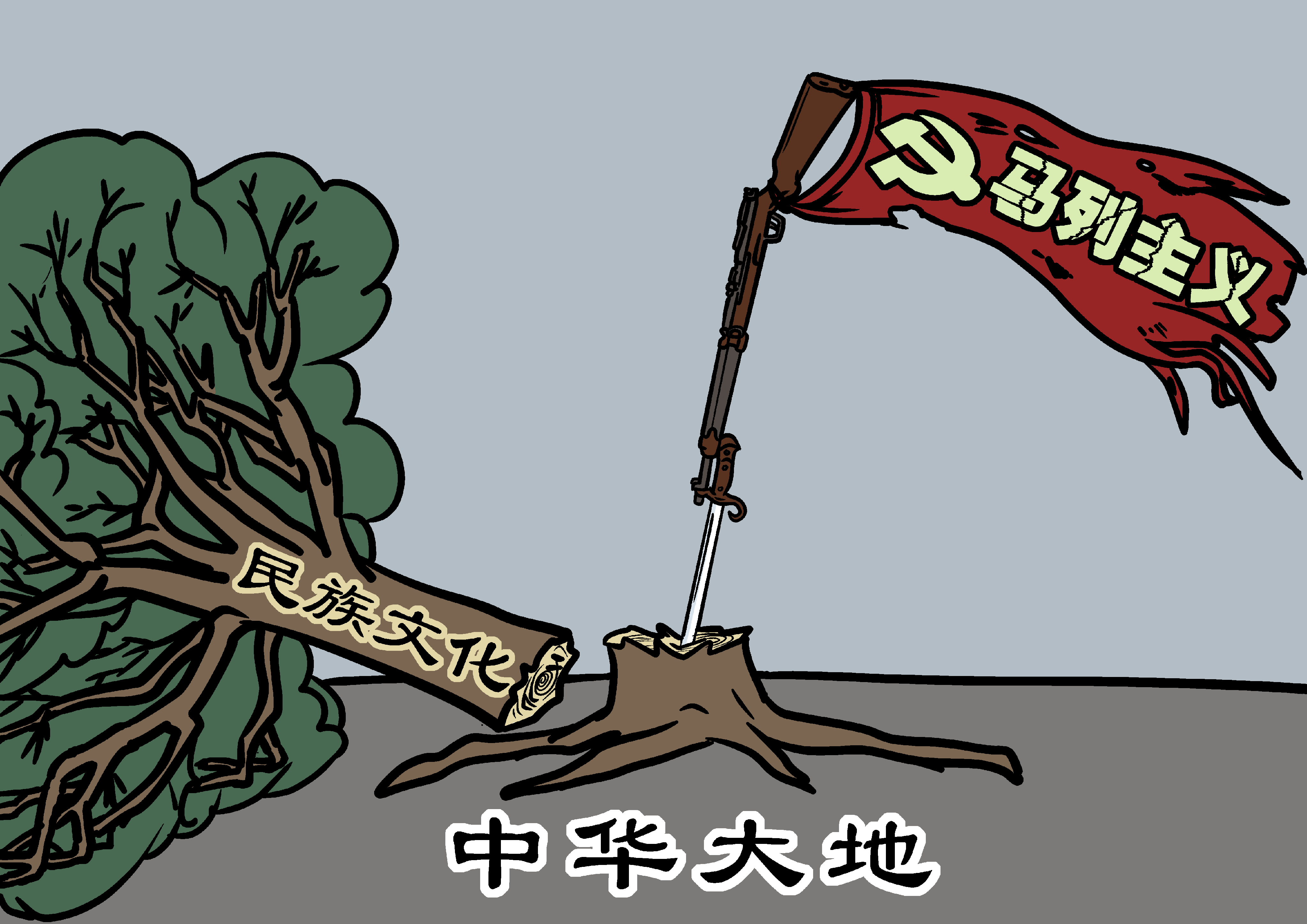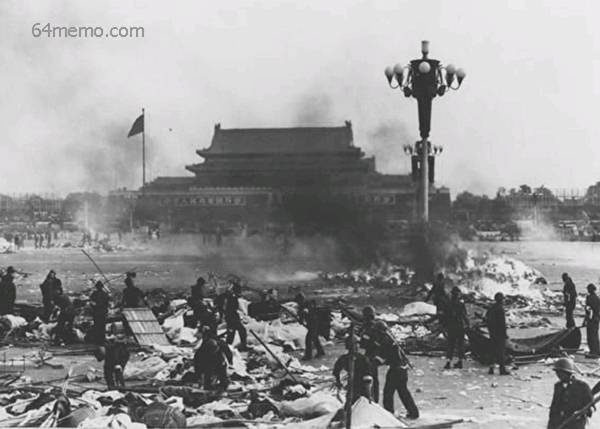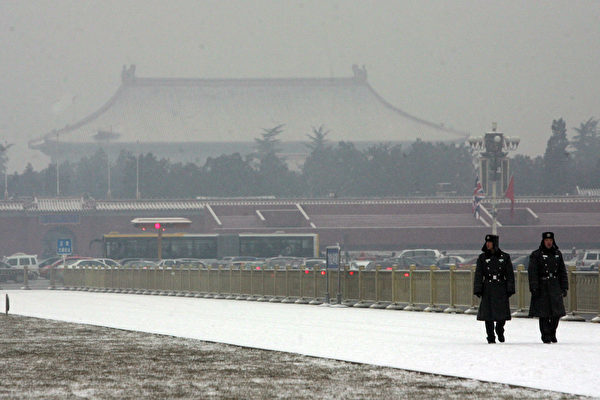(Illustration provided by Dajiyuan)
[People News] 1. Birth
I was born in the 1950s in the ancient city of Da'an, situated by the Nen River in Jilin. When my mother held me in her arms, she was amazed; I had a head full of golden hair and soft fuzz like a chick. All my siblings had black hair, making me the only one with 'yellow hair,' which became my nickname. Not long after, my mother made me grow plump and fair as if I were inflated like a balloon. At that time, she noticed that on my left palm and right foot, there were two round 'douts' that were very prominent, resembling small hills. My mother and grandmother, who were devout in Buddhism and Taoism and knowledgeable in the Book of Changes, often remarked that these two 'douts' held some significance and promised to reveal my fortune when I grew older.
My grandmother said, 'This life is already predetermined by heaven.'
Mother said, "She was born with blond hair and two 'douts'—different from other children. I just hope she can live a safe and peaceful life."
There are six siblings in our family, and I am the fifth child. At the time of my birth, I already had three older brothers and one older sister. Three years after I was born, our family welcomed a younger sister. She is twelve years younger than our eldest brother, exactly one zodiac cycle apart. The six of us siblings came into this family one after another, each born a year or two apart.
My father attended Northeast Normal University during the Nationalist era. Before he could graduate, he was assigned by the Cultural and Educational Department of the Jilin Provincial Baicheng Special Office to help establish the 'New China.' Just as he was beginning to showcase his talents and work hard, he was politically purged and exiled to the county town due to issues related to his family background, his brief service as a soldier in the Nationalist army, and his uncle's social connections, among other factors.
My mother graduated from a Normal Specialised Course during the Republic of China period and began her teaching career before the Chinese Communist Party took power. She devoted her life to education and never left her teaching position. She passed away in 1984 while working at Jilin Radio and Television University, marking the end of a challenging forty-year teaching career.
From a young age, my parents were educated in private schools and were deeply influenced by traditional Chinese culture. However, during their educational journeys, they inevitably adopted the so-called 'May Fourth' new ideas promoted by the Communist Party. This led my father, who came from an exploiting class background, to join the Communist Party, where he served as the director of the Cultural and Educational Bureau for many years before the Cultural Revolution. As a result, my family background shifted to that of a revolutionary cadre, replacing the 'black five categories' that instilled fear and hatred in my six siblings and me. This family wavered and half-heartedly provided a protective umbrella, adding a bitter and tumultuous aspect to our upbringing.
Since 1949, this country has been in a state of turmoil, and our family has not experienced many peaceful days either. The various campaigns—suppressing counter-revolutionaries, the anti-rightist movement, the Three Anti and Five Anti campaigns, the anti-rightist movement, the Four Clean-ups, the Great Leap Forward, and the so-called three years of hardship, culminating in the Cultural Revolution—were all man-made disasters! These disasters inflicted harm on people! Throughout this period, my family was consistently targeted by the 'class struggle' purges orchestrated by the evil party. From the so-called land reform initiated by the party to the Cultural Revolution and the subsequent 'counterattack against the rightist wind', my parents endured countless hardships. They either silently bore these trials or worked tirelessly to conceal them, minimising the suffering, humiliation, and upheaval to ensure that my six siblings and I could grow up without too much disruption.
Yet, from a young age, we were indoctrinated by the evil party, viewing ourselves, our family, and the world around us through a constrained and imposed lens. Our family upbringing could not withstand the cognitive patterns instilled by societal indoctrination. As I grew older, I found myself caught up in that irrational and frenzied great revolution. I began to reflect on my upbringing within this family and the so-called understanding of self, class, and revolution, and in the context of a distorted society and a twisted cultural environment, I was subtly shaped and influenced, following the ebb and flow of the entire social group.
II. Enlightenment
My maternal grandmother played just as significant a role as our parents—if not more so—in shaping our character, upbringing, temperament, and individuality. She could be said to embody the essence of "traditional values," while also possessing the enlightened grace and broad-mindedness of someone well-versed in literature and etiquette. She not only nurtured and raised my mother and uncle, but also helped our parents guide and cultivate the six of us siblings. The entire family respected and cherished her, grateful for her tireless efforts and profound influence. She brought the spirit of traditional virtue into our home.
My grandmother, Song Guiying, born in 1898, was born into the Song family, a prominent clan in the Changchun, Dehui, and Nong'an regions, known for their properties and thousands of acres of fertile land. She was the fifth of six siblings, with one younger brother. In my childhood, I often encountered her only surviving brother, my uncle, who made a lasting impression on me. This uncle served as the chief of police during the Republic of China era and was a true scholar. He was known for his integrity and had a good reputation during his tenure. He once saved the lives of two individuals, and as a result of his good deeds, he was later saved himself.
After the Communist Party took power, individuals like my uncle, who held positions during the Republic of China, were labelled as 'historical counter-revolutionaries' by the Communist Party. Consequently, my uncle did not escape the trials of various political movements, but thanks to the testimonies and protection of the two people he saved, his cases were eventually resolved as general historical issues after enduring significant hardships. However, with the onset of the repeated disasters of the 'Cultural Revolution,' my uncle was once again subjected to 'revolution.' As a direct relative of my parents, this elderly man had a profound influence on them, and each movement by the Communist Party turned his life upside down and implicated him from all sides.
In my memory, my uncle is tall, with a straight posture, full of vitality, a rosy complexion, and leaning on a civilised cane, exuding a gentlemanly charm. He visits my grandmother from time to time, always smiling and saying, 'I came to see my old sister.' My grandmother is overjoyed, her entire being radiating happiness. During these visits, my mother and grandmother would do their utmost to prepare a delicious meal for him. Looking back now, those were my grandmother's happiest moments. As the years passed, the siblings became essential parts of each other's lives. During the Cultural Revolution, both elders were persecuted to death, passing away one after the other.
My grandmother led a tumultuous life. When she was twenty-nine, my grandfather sadly passed away. He was an officer, and I have seen a rather handsome photo of him in military uniform that my mother carefully preserved. My grandmother upheld traditional values, remaining loyal and never remarrying, cherishing her deep affection for my grandfather and reminiscing about him for her entire life. From that point on, she bore the heavy responsibility of raising and educating my mother, my aunt, and my uncle; my mother and aunt are twin sisters. After enduring several wars and displacements, the Song family gradually fell into decline and eventually split apart. My grandmother relied on pawning family assets to support the education of her three children. In that era, it was the courage and bravery of sons that could not sustain such a single-parent family. By the time of the evil party's land reform, aside from raising two students—my mother and uncle—there was no land left in the family. However, the greatest blow to my grandmother was the death of my aunt during the turmoil; in her words, her heart was shattered at that time. During the land reform, she was fortunately classified as a poor peasant.
In 1945, just two months after my eldest brother was born, our grandmother came to live with my mother, staying with us until all six of us siblings were born and raised, never leaving this family.
My grandmother and parents provided us with a joyful and vibrant childhood, for which I am immensely grateful. Their early educational influence has stayed with me for decades. I can still vividly recall the Chinese mythological stories, the Twenty-Four Filial Exemplars, the tale of Zhang Liang picking up shoes, the story of bearing burdens and seeking forgiveness, the tale of borrowing arrows with straw boats, the story of lying on firewood and tasting gall, the humiliation endured by Han Xin, and the friendship between Guan and Bao that my grandmother shared with us. These captivating historical and mythological narratives have enriched my life, instilling values of sincerity, kindness, generosity, and compassion in my young heart. The countless stories immersed us deeply in the essence of traditional Chinese culture. I still remember the Twenty-Four Filial Exemplars, where my grandmother brought to life the Confucian virtues of benevolence, righteousness, propriety, wisdom, and trustworthiness through each story, making them memorable and engaging, thus laying a foundation of goodness in our young minds. Whenever she recounted the story of Xiao Wangxiang lying on the ice to catch fish for his mother, it inspired us, prompting her to ask, 'If your grandmother and parents wanted to eat fish, could you be like Xiao Wangxiang?' My siblings and I would shout in unison, 'Yes!......'
The story of 'Wang Xiang lying on a fish' instilled kindness in me; the tale of the three brothers who seized family property to plant harmful seeds taught me that good and evil have their consequences; the story of 'tying grass to repay kindness' made me appreciate the importance of gratitude; and 'carrying thorns to apologize' taught me about humility, courtesy, and tolerance, among other lessons. This gradual influence of benevolence and righteousness has led us to embrace these values as naturally as spring rain nourishes the earth. My grandmother and parents encouraged us to embody these virtues, shaping our family culture. From an early age, we learned that good food should first be offered to our grandmother and parents; siblings should practice 'Kong Rong yielding pears'; and half of our meagre monthly supply of fine grains should be set aside for guests and friends... We were taught not to impose on others what we do not wish for ourselves; to repay a drop of kindness with a fountain of gratitude; and to avoid gossip or speaking ill of others behind their backs. My mother would often remind us, 'This is the worst quality for a girl!' These lessons have been ingrained in us since childhood, forming the fundamental principles and qualities of being a good person. In our lives, we earn praise from our grandmother and parents for honouring the elderly, being sincere and friendly, and being willing to help others; conversely, we face criticism and reproach from them and our siblings when we fall short.
In those mythological tales, I once let my imagination soar with the stories of Pangu (Pángǔ) creating the world and Kuafu (Kuàfū) chasing the sun, which instilled in me a deep reverence and longing for the divine. On the seventh day of the seventh month, while my grandmother recounted the tale of the Cowherd and the Weaver Girl meeting on the magpie bridge across the Milky Way, my mother introduced us to another perspective. She pointed out which star represented the Cowherd and Weaver Girl, as well as the Big Dipper, Saturn, Jupiter, Pluto, and others. My mother also had us bring a bowl of clear water, and as we faced the bright moon, she encouraged us to lean over and look into the bowl. Through the refraction, we could perceive the moon's surface, with its craters and pits, allowing us to sense the mystery and vastness of the universe. She explained that Earth is just a small planet and that there are realms beyond our own. All of this—ancient yet fresh, real yet enigmatic—planted traditional values in our innocent minds while also broadening our horizons and expanding our imaginative possibilities.
My family and upbringing are renowned in that ancient city, with six children who are all dutiful, excelling in both character and academics, earning admiration and respect from the community to the point that even after moving away for many years, they are still remembered fondly.
I am deeply thankful to my grandmother and parents for fostering such a nurturing family environment, providing a solid upbringing and instilling the timeless virtues that shaped my childhood and youth.
(To be continued)











News magazine bootstrap themes!
I like this themes, fast loading and look profesional
Thank you Carlos!
You're welcome!
Please support me with give positive rating!
Yes Sure!